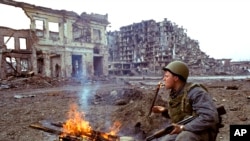On October 16, Russian President Vladimir Putin, gave an interview to the China Media Corporation before leaving Moscow for Beijing. In it, he claimed that Russia is not a “colonial country,” unlike those in the West:
“… colonial countries have always believed that they are first-rated people…
Our approach is quite different. We proceed from the fact that all people are equal, all people have the same rights; the rights and freedoms of one country and one nation end where the rights and freedoms of another person — of an entire state — appear. This is the way in which a multipolar world should be evolving gradually."
That description of Russia is false.
Over centuries, the Principality of Moscow and then Russia expanded through seizing territory inhabited by groups of people who spoke languages other than Russian and had different cultures and religions.
Modern Russia has deprived indigenous peoples of the right to self-determination. It has also launched a war of aggression against Ukraine, denying the existence of a separate Ukrainian people.
European countries also carried out colonial conquests. However, Moscow’s colonial empire was contiguous, in contrast to the classical colonial empires, whose metropolises were hundreds and thousands of kilometers from their colonies.
Writing in The Wall Street Journal, Casey Michel, an adjunct fellow at the Hudson Institute, a Washington-based think tank, described Russia’s expansion this way:
“It spent centuries conquering and colonizing Eurasia, extracting local wealth and subjugating colonized peoples to dictatorship from Moscow and St. Petersburg. The difference is that other European empires colonized overseas, while Russia colonized overland, capturing adjacent territory.”
According to Vladislav Inozemtsev, a professor of economics and senior research fellow with the Polish Institute of Advanced Studies in Warsaw, when Portugal and Spain “began their overseas expeditions in the early 16th century,” Moscow expanded to the north and east:
“They captured the Yugorian lands by 1502 and reclaimed Ryazan by 1520. They conquered the Kazan Khanate in 1552 and Astrakhan Khanate in 1556, abolished the Great Nogai Horde in 1557, and took the Siberian Khanate in 1582. These conquests coincided roughly with the Spanish appropriations in Central and South America: Haiti in 1496, Cuba and Puerto Rico in 1508, New Spain in 1519-1521, Peru and Rio de la Plata in 1535-1536, and Florida in 1565.”
Russia's colonization of Siberia, a region larger than the United States, was accompanied by wars and the extermination of various indigenous peoples. Those peoples who resisted colonization suffered the most: 90% of the Kamchadals, indigenous to the southern Kamchatka Peninsula, and half of the Voguls [now called the Mansi], indigenous to western Siberia, were killed in the 18th-19th centuries.
Russia colonized the North Caucasus in what became known as the Caucasian War, which lasted from 1817 to 1864.
According to the 19th century Russian archaeologist and explorer Adolf Berger, by 1864, only about 80,000 Circassians, just 10% of their original population, remained in their homeland because of the actions of the Russian army. Another estimated 400,000 Circassians were killed, and about a half million expelled.
In the 20th and 21st centuries, many indigenous groups in Russia lost their language, ethnic identity and were gradually assimilated into the Russian ethos. According to the linguist Olga Kazakevich, 10 languages in Russia disappeared from 1970 to 2020. Each of another 15 languages (out of Russia’s 153 remaining languages) have fewer than 20 elderly speakers left and are thus on the verge of extinction.
In the modern Russian Federation, which became independent after the Soviet Union collapsed in December 1991, indigenous groups are deprived of the right to self-determination and to have their own state, as enshrined by the United Nations.
Russia launched two wars to prevent the emergence of an independent Chechen state. During the First Chechen War (1994–1996), an estimated 50,000 civilians died, according to Doctors Without Borders, the Paris-based non-governmental organization. During the Second Chechen War (1999–2009), up to 25,000 civilians died, according to Memorial, the Russian human rights organization.
In Putin's Russia, simply calling for a referendum on self-determination of an indigenous group can lead to criminal penalties.
Russia's full-scale invasion of Ukraine in 2022 further exposed Moscow’s imperial nature. Senior Russian politicians, including Putin himself, declared that the Ukrainian nation did not exist and had no history.
Russia has organized the forced deportation to Russia of Ukrainian children from Ukraine’s partially occupied Donetsk, Lugansk, Kherson and Zaporizhzhia regions, and their adoption by Russians.
On July 4, the Parliamentary Assembly of the Organization for Security and Cooperation in Europe, which includes 323 representatives from 56 national parliaments, designated Russia as a colonial empire that denies equal rights and self-determination to indigenous peoples and ethnic minorities.





